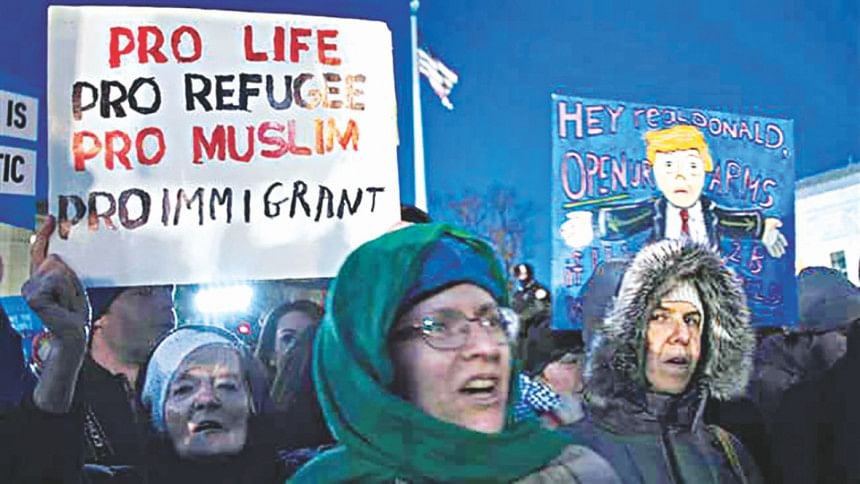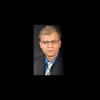Politics of “base” and its victims

FIFA World Cup is undoubtedly the most covered media event throughout the world. While American media covered football matches here and there, one particular story dominated the media for the past few weeks: separation of children from their parents in the US-Mexico border.
Most of those parents came to seek asylum in the United States, fleeing from desperate conditions in countries like Honduras and El Salvador. They were separated from their children as they waited for their cases to be heard. In some cases, parents had already been deported to their countries while their children remained in the US. This practice has been going on as President Trump adopted a "zero tolerance" policy on people crossing the border. Most Americans, including influential politicians of Trump's own party, opposed the practice of splitting children from their parents.
This is a cruel and inhumane practice and it was implemented without much forethought and preparation. This is reminiscent of Trump's botched attempt to ban Muslims from entering into the United States. Like the way Trump had to back down on the Muslim ban policy, he had to sign an executive order to stop the practice of separating children from their parents as the opposition to this policy grew louder. So, the question is: why has Trump pursued these sorts of policies and practices in the first place? Most observers believe that the Muslim ban and separation of children did not protect American interest in the long run. The objective of those policies and practices was rather political. Trump moved forward with those policies to rile up his political base, many of whom showed anti-immigrant and anti-Muslim bias. The xenophobic rhetoric to cater to people's base emotion is nothing new in politics but we saw a dramatic increase of this practice after the 9/11 terrorist attacks.
When I came to the United States in the fall of 1999 to pursue my education, I never thought I would spend much time thinking about my immigrant and religious identity in this country. But in retrospect, I think the 9/11 terrorist attacks changed so many things for me, for my family, and for people like me, precisely because a good number of American politicians began a practice of demonising immigrants and Muslims to cater to their political base. I do not blame common folks for harbouring negative attitudes toward Muslims because the 9/11 attack was a traumatic experience for them, making them fearful of the unknown. But politicians and media cannot escape their responsibilities.
Many Bangladeshi-Americans whom I talked to for my research felt that America drastically changed after 9/11. I mentioned in another essay in this publication that I conducted my dissertation research and eventually published an academic book on the effects of 9/11 on Bangladeshi-Americans. I did not have any intention to think about me being a Muslim, let alone write a book about the ordeal of Bangladeshi Muslims like me who made United States their home. I remember I consumed volumes of television news in the years following the 9/11 terrorist attacks. One can go ahead and sift through the archives and find how much television news talked about Islam and Muslims during that period. And they were not kind to Muslims. America was attacked in the most audacious way in its soil and Americans were trying to figure out and find their enemy. No matter how some politicians sugar-coated it, America largely thought it was Islam that attacked them.
American Muslims could not escape the thought that they were living in a country that considered their faith a breeding ground for terrorism. And they were deemed as enemy population, and, therefore could be subjected to extra scrutiny and discrimination. Americans, who were largely ignorant about the Islamic faith were learning about Islam through television and other popular media. No wonder their perception of Islam and Muslims took a predictable turn. Hate crimes against Muslims went up in the wake of 9/11. Open public spaces, especially streets, became lethal for poor minimum-wage earning working Muslims as many experienced hate crimes routinely. More well-off and educated Muslim-Americans were lucky not to be subjected to hate crimes, but they realised that they were becoming second-class citizens in a country where they were settling down and integrating into the mainstream society. They were fearful that their children would be discriminated in a country they would call home. There was a respite of this unsettling thoughts during the Obama presidency. When Donald Trump began his presidential campaign, Muslims in America felt that the relief was short-lived; they found their faith and community in the receiving-end of an assault again.
We still remember that Donald Trump began his campaign on two promises: building a wall along the Mexican border and banning Muslims from entering the United States. Those were, as political commentators identified, "red meat" for his base. He repeated those promises in his campaign rallies amid his enthusiastic supporters' chant of derogatory remarks about Islam and Muslims. He claimed that Muslims in New Jersey celebrated the 9/11 terror attacks saying that he had video evidence to support his claim. No such video ever existed but Trump never apologised for that. He surrounded himself with people who uttered derogatory remarks about Islam and Muslims. His pick for National Security Advisor, (Ret) General Michael Flynn, has publicly said that Islam was not even a religion; it's a cult.
Not only Muslims, immigrants in general sadly saw Trump ratcheting up his rhetoric against them to cater to his political base. He called Mexicans rapists. In the midst of the recent border controversy, he said that immigrants were infesting America. Trump should remember that his words bear real consequences, especially for minority immigrants and vulnerable Muslim Americans. He and other politicians need to find a way to talk about terrorism and national security without disparaging Islam and Muslims. Meaningful policy discussion on immigration can be carried out without dehumanising immigrants.
Shafiq Rahman is a Professor and the Chair of Communication and Social Sciences Department at Chadron State College, Nebraska, USA.





Comments